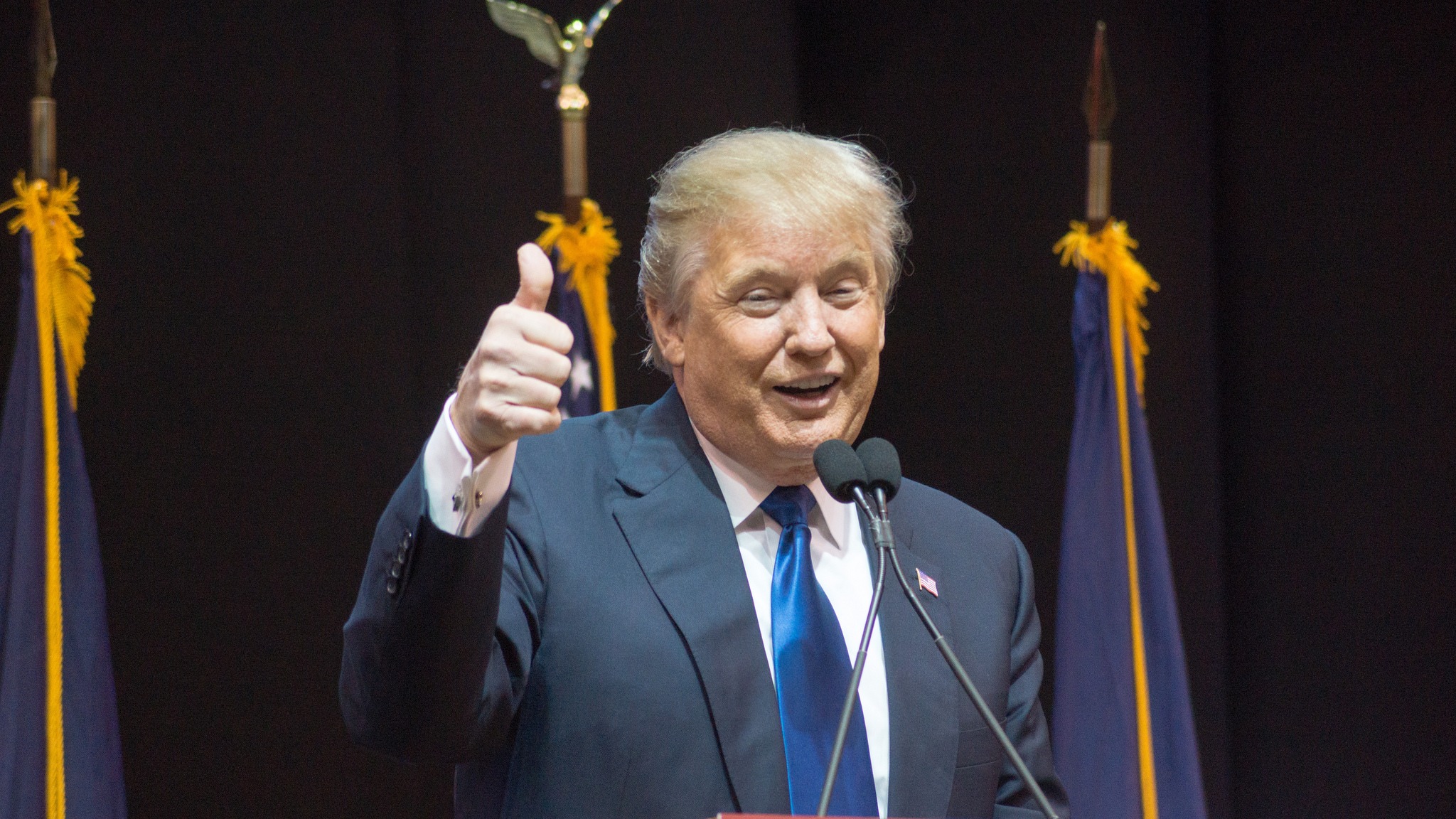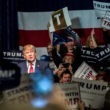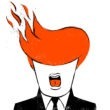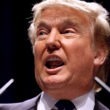Image Credit: Marc Nozell
Can anyone capture the essence of Donald Trump? What, if anything, is at his core?
Journalists have been trying to define Trump ever since his rise to prominence in New York in the 1970s. And since his presidential campaign accelerated last fall, the takes on Trump have multiplied exponentially. There’s no way to say—yet—which of America’s political writers and analysts have come closest to capturing the essence of Trump. But in their efforts we see something else: the way we look at Trump says much about the way we perceive our nation in 2016. As we’ve moved from laughter to alarm we are wondering what nation we’re living in. Here’s a look back at some of the high-dudgeon marks from what is only Phase 1 of this flood of coverage: 13 ways of looking at Trump—and the Trump phenomenon.
1. He’s comedy gold
From the time Spy magazine came on the scene in 1986, Donald J. Trump was the parody magazine’s comedy goldmine. Spy defined him as a buffoon, a callow scion who was in way over his head in the New York–New Jersey development world. He was a regular on their “Most Annoying New Yorkers” list. He was a “Queens-born casino operator.” He was a “well-fed condo hustler.” He was “an ugly cuff-link buff.” Most famously, he was “a short-fingered vulgarian.”
Spy is long gone, but among those who have most energetically carried forth the parodic (heavily adjectival) tradition are the writers at Jezebel. Here, Trump has been described as a “Cheeto-dusted bloviator,” a “swollen earthworm gizzard,” a “yellowing hunk of masticated gristle,” “a pair of chapped lips superglued to a hairball,” and a “poorly-trained circus orangutan.” The ur-Jezebel attitude, similar to Spy’s in its cultivated disgust, was expressed by writer Anna Merlan in December: “No matter how much hand-wringing the media does, no matter how many times we point out what a dick he is, what a liar, it does no good. Like a trash monster that feeds on sewage, it only makes him stronger.”
2. He’s a brand name
John Oliver, in his now-famous February rant on HBO’s “Last Week Tonight” (“Make Donald Drumpf Again”), marveled at how Trump’s own name seems to fuel his success. It’s a point well noted by Gwenda Blair in her book The Trumps: Three Generations That Built an Empire (Touchstone, 2000):
“In a sense, Donald Trump had merely polished to the highest of glosses what was already there. ‘Trump’ is a wonderful word, a marvelous name. A name Dickens would surely have given to a prominent character if only he had thought of it. ‘Trump’ evokes trump card, trump hand, trump suit—all terms associated with winning. Whether Donald Trump could have had the same success with any other name is an intriguing question. How fortunate that ‘Drumpf,’ the unresonant original version, evolved over the centuries to the current orthography.”
3. He’s a ‘winner’ who will eventually lose
Many have predicted Trump’s self-image won’t weather losing. (It still could prove true!) Here was David Roberts writing early this year on Vox:
“Trump’s vulnerability (like his strength!) is that his appeal is entirely personal, entirely based on the expectation that he’s a winner who will win. He’s an alpha male, the top dog, the guy with the balls and the leverage to get the good deals, the guy who can’t be intimidated, the self-made, independent guy who’s not afraid to say what everybody’s thinking. ‘I play to people’s fantasies,’ he wrote in The Art of the Deal. ‘People may not always think big themselves, but they can still get very excited by those who do. That’s why a little hyperbole never hurts.’ [But] . . . the same belligerence that looked like strength when Trump was on top will look defensive and bitter when he’s not. And the more doubtful or skeptical voters and the media become, the more Trump will escalate, the more his chest will puff. He doesn’t know any other strategy. He’ll enter a negative spiral as self-reinforcing as his rise has been.”
4. He can’t be serious
A theory emerged that Trump never expected to win the Republican nomination, much less the White House. Matt Labash described Trump’s recklessness in March in The Weekly Standard:
“Even Trump seems unable to stop Trump, though it sometimes feels as though he’s trying harder than anyone. It’s not your everyday candidate who can, in the space of two weeks, still sit atop the polls after picking up endorsements from both Louis Farrakhan and David Duke, after retweeting a Mussolini quote, after dismissing with the wave of a hand a charge that his campaign manager assaulted a young woman reporter, and after offering to pay the legal fees of a supporter caught on-camera sucker-punching a protester (whom the supporter later suggested might need to be ‘killed’).”
At the Huffington Post, Lauren Weber, Jason Linkins, and Howard Fineman listed eight pretty plausible reasons demonstrating that the Trump campaign never intended to go as far as it did. Writing in early April, they mused, “What if the unrelenting dumpster fire that is the candidacy of real estate mogul and encrimsoned anger-haggis Donald Trump was one big terrible prank on everyone? What if it were like most April Fools’ Day japes — a hackneyed joke that inevitably goes too far and collapses on everyone involved?”
The theory received at least one insider’s endorsement after Stephanie Cegielski left a Trump super PAC and wrote a blog post claiming, “He doesn’t want the White House. He just wants to be able to say that he could have run the White House. He’s achieved that already and then some. If there is any question, take it from someone who was recruited to help the candidate succeed, and initially very much wanted him to do so.”
5. He’s an updated George Wallace
Many writers have made the case that Trump’s success is driven by racism, pure and simple. Jamelle Bouie put it this way in Slate:
“There is no question that Trump has run the most unapologetically racist and nativist campaign since George Wallace made his first national play in 1964. And, like Wallace before him, it’s been successful, drawing tens of thousands of people to massive rallies across the country. Trump probes their fears, excites their passions, and gives them voice in a way they love and understand. ‘We have losers. We have people that are morally corrupt. We have people that are selling this country down the drain,’ Trump declares. . . . Economic anxiety plays a part here. But maybe Trump has discovered something we all like to deny: That in the 21st century, the racist vote is larger, louder, and more influential than we ever thought.”
6. He’s an unreconstructed misogynist
On the other hand, it could be sexism. Many websites and publications, including The New York Times in May, have published inventories of Trump’s objectionable attitudes toward women. Several sites have compiled lists such as this one in June by Claire Cohen in The Telegraph: Donald Trump Sexism Tracker: Every Offensive Comment in One Place. The record goes back a long way. Trump once took offense at a Gail Collins column in The New York Times and sent her a copy of the column with her picture circled and “Face of a Dog!” scrawled on it. Anna Holmes, writing in The Washington Post in April 2011, when Trump was rumored to be considering a run for president, noted the Collins incident and many others like it. Her commentary on his record reads like it’s right out of 2016 campaign coverage:
“Sleazy and sexist, yes, but these may be the most revealing comments that Trump has ever made. For one thing, they spotlight Trump’s particular brand of boorishness, in which the easiest way to dismiss a woman he disagrees with is to insult her appearance. . . . Secondly, his utterance lay bare the modus operandi of the unreconstructed misogynist, in which women should be sexy, but not sexual (. . . the Miss USA organization denies entry to contestants who have ever been married or ‘given birth to, or parented, a child’); a willingness to relinquish autonomy over one’s fertility is both an asset and a job requirement; and female worth is quantified not by character or accomplishment but by hip-to-waist ratio. . . . Perhaps this legacy of unapologetically gleeful misogyny — not his reputedly shady business practices or his absurd questions about President Obama’s birthplace — will end up being Trump’s electoral Achilles’ heel.”
7. He’s a ‘gaslighter’
Nicole Hemmer in U.S. News & World Report applied a term often used to describe one form of manipulative behavior in abusive relationships: gaslighting.
“Through manipulation and outright lies, they so disorient their target that the person (or in this case, the country) is left defenseless. Trump is a toxic blend of Barnum and bully. If you’re a good mark, he’s your best friend. But if you catch on to the con, then he starts to gaslight. Ask him a question and he’ll lie without batting an eye. Call him a liar and he’ll declare himself ‘truthful to a fault.’ Confront him with contradictory evidence and he’ll shrug and repeat the fib. Maybe he’ll change the subject. But he’ll never change the lie.”
8. He’s a chimp on a tractor
Republican political consultant Mike Murphy teed off on Trump in an interview with The Weekly Standard’s Matt Labash:
“He doesn’t understand the presidency. You don’t call up the head of Mexico and say, ‘Hey, I’m going to build a fabulous wall with first-class gold toilets and you’re gonna pay for it.’ You don’t call up the head of the Ford Motor Company and say, ‘You can only manufacture things in the U.S. or I’m going to unilaterally impose tariffs.’ He has no understanding of presidential powers. He has no understanding of Congress. It’s like putting a chimp in the driver’s seat of a tractor. He’s not going to plow the field. He’s going to drive the tractor into the lake.”
9. He’s a trickster god
Corey Pein, writing for The Baffler, delved into mythology for an explanation:
“The key to understanding this election cycle—and its energetic locus, Trump—is to accept that we are not dealing with an ordinary man, bound by the rules of decorum and the presupposition of coherence. I have another idea. I propose that Donald Trump is the personification of a Norse god named Loki. . . . Everyone keeps asking, how does he do it? How does he get away with the outbursts of expletive and blasphemy, with cruel mockery of disabled people and torture survivors, with the rambling incestuous fantasies? What I am saying is that Trump doesn’t need to play by the rules because he is the fabled shape-shifting trickster wearing the orange skin of a man and the hair of a wily red fox. That is how he gets away with it.”
10. He thinks it’s all about ‘The Deal’
Adam Davidson, writing in The New York Times Magazine, captured the sheer absurdity of Trump’s claim to expertise:
“Donald Trump loves the word ‘deal.’ The book he released with a co-writer in 1987 to summarize his views of the world was called, of course, ‘The Art of the Deal.’ . . . The centrality of the ‘deal’ to Trumponomics is especially strange when you consider how tangential that concept is, or at least should be, to a modern economy. In Microeconomics 101, deals are an afterthought: Transactions have the most socially optimal outcome when buyer and seller reach a mutually beneficial agreement. The very idea of a ‘good’ deal for one party and a ‘bad’ deal for another suggests a suboptimal outcome; an economy built on tough deal-making, with clear winners and losers, will always be a poorer one. . . . If you think of the transactions that make people the most frustrated, they are, most likely, rent-seeking transactions in which some force is imposing a better ‘deal’ for one party. . . . As an economic journalist, when trying to explain the idea of rent-seeking, I have always used one quintessential example from the United States—a sector in which markets don’t function, in which excess profits are held by a few. That world is Manhattan real estate development.”
11. He thinks it’s all about his deal
“I guarantee you there’s no problem. I guarantee you,” Trump famously said in a televised GOP debate this spring. It was another “how low can he go?” moment. Did the man just suggest penis size is a qualification for higher office? The Twitteratti went wild, and New York magazine’s Eve Peyser jumped in with a documentation of “Trump’s journey to the GOP nomination, told through a history of what matters most to him: his own penis.” Guess what? The subject has come up many times before.
12. He’s ‘exhaustively vile’
Paul Slansky uncorked this one in February in the Huffington Post:
“Of course, as no one needs to be reminded, Trump is exhaustively vile: a crass boor, an uncouth lout, a coarse churl, by any accepted standards of human behavior utterly repulsive. He is a multi-billionaire—really, just think about what a happy and generous person you would be if you had billions of dollars—whose only true joy in life seems to derive from inflicting pain. For him, the best thing about being rich is the ability wealth confers to behave badly with impunity, especially toward those who most thoroughly disdain him: the Republican establishment that created him, suicidally underestimated him, and now has not a clue of how to scrape him off its shoe.”
13. He’s the next president
If there’s any chance for Trump it may lie in the combustible popular discontent with globalization and immigration—which blew up in Britain in June. Could it happen here? The vision of Anis Shivani, published by Salon in May, reads like dystopian fiction. (Shivani is, in fact, a novelist.) Here, his imagination takes us to a dark place:
“Americans, like people everywhere rising up against neoliberal globalization . . . want a return of social relations, or embeddedness, to the economy. . . . Capitalism today is placeless, locationless, nameless, faceless, while Trump is talking about hauling corporations back to where they belong, in their home countries, fix them in place by means of rewards and retribution, like one handles a recalcitrant child. . . .
In this election, abstraction will clearly lose, and corporeality, even if—or particularly if—gross and vulgar and rising from the repressed, will undoubtedly win. A business tycoon who vigorously inserted himself in the imaginations of the dispossessed as the foremost exponent of birtherism surely cannot be entirely beholden to the polite elites, can he? . . . After all, he posed the elemental question, Where were you born?
What is common between the ‘multitudes’ who show up for the Trump and Sanders rallies? Both constituencies are rebelling against the empire of capital, the empire of the market (whether the right calls it the New World Order or the left calls it free trade), and they show up naming empire as such. In this election campaign, whoever names the empire of the market wins (Trump, or Sanders had he been able to overcome the barriers erected by the Democratic party), and whoever hides its name (Clinton), loses. Are these rallies, Trump’s and Sanders’s, aesthetic spectacles, or are they radical politics? The market does not have an answer to this question, or rather it has already answered it to its own satisfaction.”
Dave Denison is an associate editor at The Baffler and copy editor for The Washington Spectator.







0 Comments
Trackbacks/Pingbacks